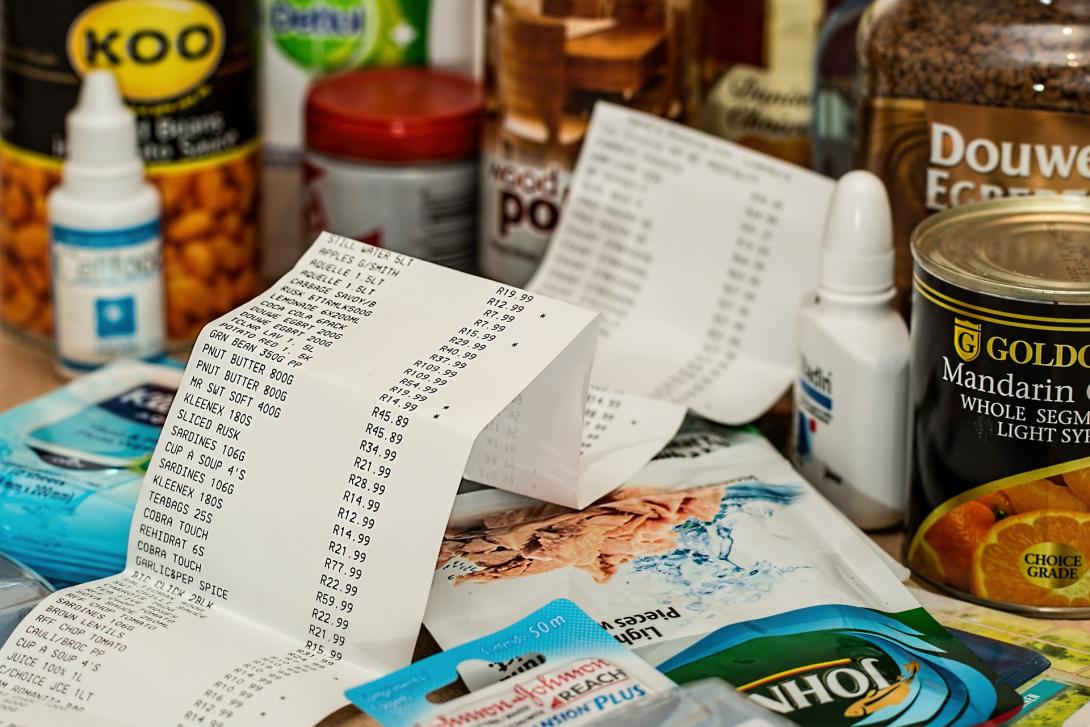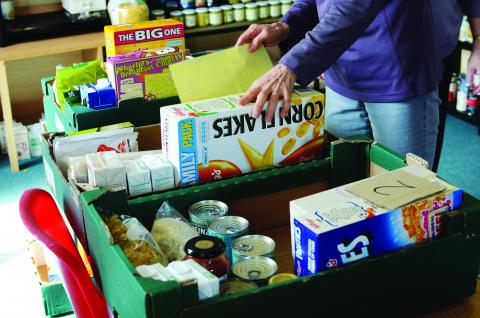26 May 2023
Food Prices Tracker: May 2023

by Josh Day
Food inflation hits 19.1% according to Government data.
Inflation has dropped to 8.7% in the 12 months to April 2023 (CPI), falling below 10% for the first time since September last year but falling short of the Bank of England’s forecast of 8.4%. Food inflation – which is at a 45 year high of 19.1% (CPIH), dropping by only 0.1 percentage point since last month - has taken centre stage as the biggest contributor to overall inflation. The cost-of-living crisis has been largely dominated by sky high energy prices, but we are now seeing energy prices begin to fall with food inflation becoming an increasingly greater contributor to the pressures being felt by households. Last month, the Bank of England raised interest rates for the 12th time in a row in an attempt to ease inflation.
The cost of The Food Foundation’s Basic Basket has increased by 24-27% since April 2022.
The Food Foundation’s Basic Basket is a shopping basket tracker measuring weekly price changes in what the average man and woman could typically buy as part of a reasonably costed, adequately nutritious diet (see FAQs for further details). Since we began tracking in April 2022, the woman’s basket of food has increased in price by 23.6%, now costing £49.41 per week. The man's basket has increased by 27.1% and currently costs £54.05 per week. Supermarkets lowering prices on milk and Tesco lowering the prices of 30 essential products have yet to make a substantial impact on the cost of a weekly shop.
First UK Farm to Fork Summit at Downing Street as Horticulture Strategy is scrapped.
Last week Prime Minister Rishi Sunak and Environment Secretary Therese Coffey held the first ever UK Farm to Fork Summit at 10 Downing Street. At the summit, they met with representatives from across the UK food supply chain in order to discuss rising inflation, food prices and food shortages.
The summit took place after Minister Mark Spencer confirmed that DEFRA were no longer planning to keep their commitment to deliver a horticulture strategy for the UK. Many had hoped the horticulture strategy would help support the production and consumption of British fruit and veg at a time when global factors have shown the risks of our high dependence on imported produce. Some positive announcements at the summit included that 45,000 visas will be available for seasonal horticulture workers with potential for a further 10,000 if needed and an expanded farming scheme to replace the Fruit and Vegetable Aid Scheme when it ends in 2026. Although this begins to address some of the issues within the UK’s supply chain, it is a disappointment to not see the Horticulture Strategy, promised in the National Food Strategy, come to fruition as this was an important opportunity for Government to set out a bold plan for growing and eating more fruit and veg in the UK.
Did the Food to Fork Summit do enough to address food security?
So far this year, supermarkets across the UK have struggled to keep shelves from going empty as production costs for growers have soared and unrelenting labour shortages have resulted in pressures on supply. To make matters worse, this comes as imports that the UK relies on were impacted by unexpectedly poor yields due to cold weather and floods. At the same time the price of what is on supermarket shelves has continued to rise and stay high, contributing to the ongoing cost-of-living crisis and the number of households experiencing food insecurity. Further to this, there are fears that post Brexit red tape set to phase in this year, bringing inspection fees and more thorough checks on imports, could lead to further food shortages and cost pressures.
Reactions to the summit have been varied. Though the summit was billed as a food security summit, it was more narrowly focused on fixing some immediate supply chain problems and did not consider the long-term food security challenge, either at the national or household level.
This represents a missed opportunity to focus on the real effects the cost-of-living crisis is having on people across the UK. It is also important to remember that food inflation disproportionately affects minority ethnic groups, people living with disabilities and the poorest fifth of British households. In fact, a report from Resolution Foundation found that low-income households feel the impact of the cost-of-living crisis more severely than others. Their study shows that households in the lowest decile experience inflation 3 percentage points higher than those in the highest decile. Further to this, the report also makes clear the extent to which the cost of food specifically impacts households during the cost-of-living crisis making up a significantly larger part of household spending than energy. The study found that on average 5% of household costs were made up of spending on energy compared to the 13% on food. Additionally, low-income households do not have the same coping strategies available to those on higher incomes. Switching to cheaper brands is a common strategy for keeping costs down when buying food but, for those already relying on the cheapest products available to them this is not a viable option. Because of this low-income households often have to scale back the amount they buy and, ultimately, the amount they eat to spend less, with 61 percent of the poorest one-fifth of households reporting cutting back on food and other essentials.
On 15th May, the Competition and Markets Authority announced further work into to why prices in the UK are reacting so slowly to global food commodity prices which began falling a year ago.
On the 23rd Jeremy Hunt met with food manufacturers, urging them to do more to ease the pressures on consumers. However, industry representatives denied claims that they were imposing unreasonable prices on consumers, insisting that in fact they had absorbed up to 80% of the additional costs from energy, transport, and labour.
Government is yet to take sufficient steps to address sky high food prices and tackle household food insecurity to ensure that everyone can afford the food they need during the on-going cost-of-living crisis.

Josh joined The Food Foundation in 2023 as part of the Rank Foundation’s Time to Shine scheme. He completed a BA in Film Studies before continuing to study an MA in Culture and Critical Theory. Before moving to The Food Foundation Josh worked in a variety of roles in a primary school setting, utilising his experience to support the most vulnerable and disadvantaged members of the school community. Josh is interested in the impact that food systems and environments have on people's lives and is driven by a desire to ensure people have better access to a healthy and nutritious diet.

Shona joined The Food Foundation as a Project Officer in 2019 and has worked on research, policy and advocacy across a range of projects over that time including leading our food insecurity surveys and flagship annual Broken Plate reports. She now works across the charity's policy portfolio including our children's food campaigns, food insecurity and food environments. She is a Registered Associate Nutritionist with a background in clinical nutrition who worked in dietetic departments in NHS hospitals before joining The Food Foundation.

Indu joined The Food Foundation in 2019 as part of the Rank Foundation’s Time to Shine scheme, moving into a Project Officer role in 2020. She works on the Peas Please and Plating up Progress projects. Prior to joining The Food Foundation, Indu completed a MSc in Public Health and a BSc in Human Nutrition. She is interested in reducing health inequalities, children’s health and wellbeing, and sustainable and nutritious food system/diets. Indu is also a lover of veg, having recently taken up urban gardening.





